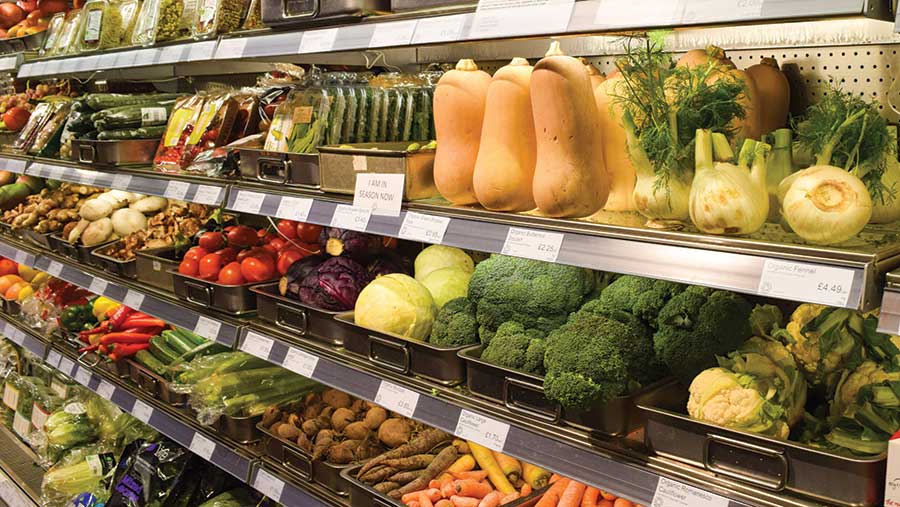Top tips for doing business with supermarket buyers

The relationship between suppliers and supermarket buyers is often strained due to the fiercely competitive market and endless price wars.
The UK government introduced the Groceries Supply Code of Practice (GSCOP) in 2010 to protect food and drink suppliers to major supermarkets from some of the more extreme buying practices.
David Miles, a buyer-seller expert and director of The Retail Mind, a groceries retail consultancy practice, says the code has been helpful in setting a legal framework for acceptable conditions for buyers and suppliers to operate in.
See also: Food prices: Why farmers get the smallest share and how to change it
However, he believes a “hands-off approach” to the farming sector from the UK government has allowed market forces to dictate, which has “added a huge strain on an already strained relationship”.
Many farmers who use his services complain they do not feel they have any power in the relationship with their buyer.
“Unfortunately, the pressure on the buyer means he or she pays less attention to the needs of their farmer-supplier and to the longer term, and is much more focused on what they need right now,” he adds.
But Mr Miles, a former commercial director at Asda, says suppliers have more power than they realise in the relationship.
Five-point plan for better cost price
David Miles recommends suppliers follow a five-point plan when negotiating with supermarket buyers for a contract or a cost price increase:
- Plan
- Debate
- Propose
- Bargain
- Agree.
Most suppliers spend too much time bargaining with the buyers (stage four), he says. Instead, they should devote 80% of their time to stages one and two – planning and understanding the scenario for both sides before starting to work with the supplier.
Stay in control
Supermarkets can exert considerable buyer power over suppliers, Mr Miles says. Choice is probably the biggest slice of power in the buyer’s favour. “If they are not happy, a buyer can go elsewhere,” he explains.
However, knowledge of the bigger picture and trust, especially from a long-term buying relationship, can work in the supplier’s favour.
“If someone can trust you, that is really powerful because the world is full of bandits and rogues,” Mr Miles says.

David Miles © The Retail Mind © NFU
“Trust is longevity because it is earned. It’s overcoming obstacles and failures. It is consistency and doing what you say you’re going to do. That needs to be reinforced as part of the discussions.”
If a buyer is contracted with someone who is doing a great job, they are more likely to stick with that person, he adds.
Taking on a new supplier also comes with risks. “Do I know I can trust them? Will they just jump straight into bed with a rival retailer?”
Fostering good relations with the technical team that is operating behind the buyer can also strengthen the supplier’s position.
Understanding the buyer
The cost-of-living crisis has hit consumer spending and buyers will be under pressure to offer the lowest price.
Mr Miles recommends suppliers consider their buyer’s needs when making their preparations for contract/price discussions.
“Who are they competing with? Which competitor/s in the retail sector are they worried about? What are the differences in their ranges in the areas you are supplying with their competitors? How do they price it?” he asks.
Understanding the buyer’s aims will help you, as the supplier, to support them in what they need to compete, which is ultimately why they buy that range.
“Sales is the lifeblood of the whole machine. The buyer is given sales and profit targets,” Mr Miles says.
“Their world is driven off a sales report every morning. They are measured every day on what they are selling in the supermarket, so they can see how good or bad they are performing.
“If that is good, they will have their chest out, but if it is missing, you will be the laggard in the group. It’s a very competitive environment.”
Buyers also have a profit plan, but profitability is usually assessed monthly, or quarterly, he adds.
The professional experience of buyers varies hugely case by case, but they will have received legal training for GSCOP compliance and sophisticated negotiation training.
Buyer responses
Suppliers can face difficult scenarios in their negotiations with buyers. For example, buyers can tell farmers their products are too expensive and can be sourced more cheaply on the continent.
“This tactic is used when a buyer who may not have a lot of time wants a lower price and will try to put the farmer under the maximum amount of pressure to accept,” says Mr Miles.
Farmers need to prepare well for negotiations and understand the buyer’s alternatives.
“You’re the expert and this is where the power comes in,” says Mr Miles. “The buyer often doesn’t understand the intricacies of the supply chain, lead-in times and what else is going on to fulfil the continuity of supply.
“That is the subtle way you need to compare what they get from you with the ‘rogues and bandits’ elsewhere.”
Buyers also compare their prices with those on offer by rival supermarkets, especially if they are lower.
Before existing suppliers are coming up to their next contract renewal, they can be asked to consider a promotion for their products.
For example, another retailer may be doing a promotion and the buyer may try to take advantage and ask for a 25% reduction in your price in the middle of the season.
In such scenarios, Mr Miles advises farmers to check the terms and conditions of their contracts to avoid being mistreated.
Cost price increase
Negotiating a cost price increase (CPI) with your supplier can be tricky – even if external pressures merit one. Sometimes buyers tell suppliers they are the only one requesting an increase.
Mr Miles says farmers can get the ball rolling with a telephone call, or a letter setting out their reasons for requesting an increase.
“When a supplier presents the case for a CPI, you must go into the meeting fully prepared, with figures from your accountant on labour, packaging, transport, energy, fuel, feed and other inputs,” Mr Miles advises.
The buyer has been trained to say no, he points out, so how the farmer approaches this and the language he/she uses is important.
“You must be very demonstrative and say, ‘the prices need to go up from this date, by this much, because this is the pressure that is being put on my costs’,” he advises. “If you say we’d like you to put our prices up, you won’t get anywhere.”
When the buyer says no, the supplier should respond by acknowledging that a CPI will put pressure on the buyer’s margin or retail prices. But the supplier should stay calm and stick to the facts.
“If you are cold, calculated and calm, that says it is an announcement of a cost price change, not a negotiation,” says Mr Miles.
Case study: Know your numbers and stick together, says grower
Internal alignment within the entire farming business helped to gain a supermarket cost price increase (CPI) for one grower.
The grower, who did not want to be named, says before he approached the buyer with a CPI, everyone in the business, including the owners and directors, was aligned with the numbers.
Setting the case out to the buyer, the grower gave notice when the CPI should go live, including a date.
As expected, the buyer refused, insisting “no one else is asking for a CPI” and saying the grower was “incompetent and shouldn’t be running a business”.
But the supplier stayed in control, as he had set a clear deadline, knew his numbers and when the CPI was to go live.
The buyer tried to find weaknesses in the business and went over the supplier’s head to the decision-makers/owners.
“Because we were all internally aligned to the numbers and the deadline, the buyer got nowhere,” says the grower.
The buyer prolonged the process to the 11th hour, tried to negotiate the numbers, telling the grower it could not sign off CPIs at that time, and also tried to extend the deadline.
“We had the backing of the whole business. Because we knew when to walk away, this prevented it turning into a negotiation and, eventually, we got the CPI through,” the grower says.
NFU backing
NFU Horticulture adviser Christine McDowell says many farmers and growers are struggling to recover soaring costs from the market, with some sectors such as fresh produce being hit extremely hard.
That is why the union has partnered with The Retail Mind to help members understand buyers’ bargaining tactics and use that knowledge during a negotiation.
Ms McDowell says: “Although geared toward the retail buying trade, the principles can be applied to any buyer-seller relationship, regardless of what you’re selling, or who your customer is.
“It’s all about building power, staying in control and being aware of your alternative, to give you the confidence to know when to walk away.”
David Miles is holding a negotiation training workshop on 22 March and a CPI workshop on 19 April at the NFU’s HQ in Stoneleigh, Warwickshire. For more details, visit bit.ly/retail-workshops.





